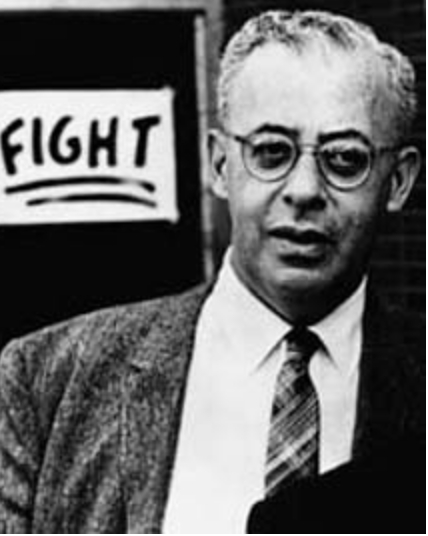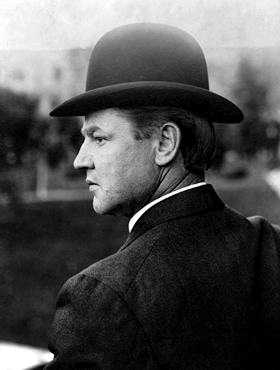labor-leaders
Saul Alinsky

On this date in 1909, community organizer Saul David Alinsky was born in a Chicago slum to Russian-Jewish immigrant parents. Alinsky said in an interview that they “were strict Orthodox; their whole life revolved around work and synagogue.” When asked if he was devout as a boy, he responded, “I suppose I was — until I was about 12. I was brainwashed, really hooked. But then I got afraid my folks were going to try to turn me into a rabbi, so I went through some pretty rapid withdrawal symptoms and kicked the habit.” (Playboy, 1972)
Alinsky majored in archaeology at the University of Chicago, but after two years of graduate study he left to work as a criminologist for the state of Illinois. In the mid-1930s, he started working with the Congress of Industrial Organizations (CIO) and became a close friend of John L. Lewis. Alinsky shifted from labor to community organizing in 1939, focusing first on improving the impoverished slums he grew up in. In 1940, millionaire Marshall Field III provided him with funds to start the Industrial Areas Foundation (IAF), which grew into a prominent training institute for radical community organizers across the country.
Dolores Huerta and Cesar Chavez were connected to the IAF, along with numerous other organizers and movements. Alinsky’s “street-smart tactics influenced generations of community organizers,” including President Barack Obama and Hillary Clinton, who wrote her senior honors thesis at Wellesley College on Alinsky (New York Times, Aug. 22, 2009). The Times said Alinsky was “hated and feared in high places from coast to coast” for being “a major force in the revolution of powerless people.”
His political philosophy was very nonconformist, and this carried over into his personal life. When asked if he had ever considered joining the Communist Party, he told Playboy, “Not at any time. I’ve never joined any organization — not even ones I’ve organized myself. I prize my own independence too much. And philosophically I could never accept any rigid dogma or ideology, whether it’s Christianity or Marxism.” The goal of the radical, Alinsky explained in his last book, Rules for Radicals (1971), must be to bring about “the destruction of the roots of all fears, frustrations, and insecurity of man, whether they be material or spiritual.” Enemies of the poor “can no more live up to their own rules than the Christian church can live up to Christianity.”
In a move that horrified the Religious Right, Alinsky dedicated the book to the devil: “the first radical known to man who rebelled against the establishment and did it so effectively that he at least won his own kingdom — Lucifer.” His first book, published in 1946, was Reveille for Radicals. Three years later he published John L. Lewis: An Unauthorized Biography.
Alinsky married Helene Simon, another University of Chicago student, and they adopted two children, Kathryn and Lee David. Helen tragically drowned in 1947. He was married to Jean Graham from 1952 until their divorce in 1970. The next year he married Irene McInnis. He died of a heart attack in 1972 at age 63 while walking in Carmel, Calif. His ashes were buried in a family plot in Chicago. On the marker is a quote from Thomas Paine that also appears in the epigraph of Rules for Radicals: “Let them call me rebel and welcome, I feel no concern from it; but I should suffer the misery of devils, were I to make a whore of my soul.” (D. 1972)
PHOTO: Alinsky in 1963; photo by Pierre869856, CC 4.0.
“If you think you’ve got an inside track to absolute truth, you become doctrinaire, humorless and intellectually constipated. The greatest crimes in history have been perpetrated by such religious and political and racial fanatics.”
— Alinsky, 1972 interview with Playboy magazine
Bill Haywood

On this date in 1869, William Dudley “Big Bill” Haywood was born in Salt Lake City, Utah Territory. In 1896, when working in an Idaho silver mine, Haywood joined the Western Federation of Miners and became active in the union. By 1900 he was already a member of the union’s General Executive Board. Haywood was an advocate for industrial unionism, uniting all workers in “one big union,” and was a founding member of the Industrial Workers of the World (Wobblies) in 1905.
Haywood advocated direct action and strikes and was involved in many strikes, where he used innovative tactics in order to attract the attention of the press. He had been involved with the Socialist Party of America but he and many IWW members wanted to focus on direct action and radical revolution instead of electoral politics and split from the Socialists in 1913. Haywood was also an advocate for racial unity in the labor movement, bringing black and white workers in segregated states into IWW-affiliated unions.
In 1917, Haywood and 164 other IWW members were charged under the Espionage Act of 1917 for “conspiring to hinder the draft, encourage desertion, and intimidate others in connection with labor disputes.” Judge Kenesaw Mountain Landis presided over the five-month trial. Haywood was convicted and sentenced to 20 years in prison but skipped bail and fled to the newly formed Soviet Union.
Haywood served as a labor adviser to Lenin’s government until 1923, when Stalin rose to power. He did not speak Russian, and his Russian wife did not speak English. He died in 1928 from complications of alcoholism, diabetes and a stroke. After his cremation, his ashes were split between the Kremlin Wall necropolis in Moscow and Chicago, where they were buried near the Haymarket Square Martyr’s Monument.
"To me [Christianity] was all nonsense, based on that profane compilation of fables called the Bible."
— "Bill Haywood's Book: The Autobiography of Big Bill Haywood" (1929)
